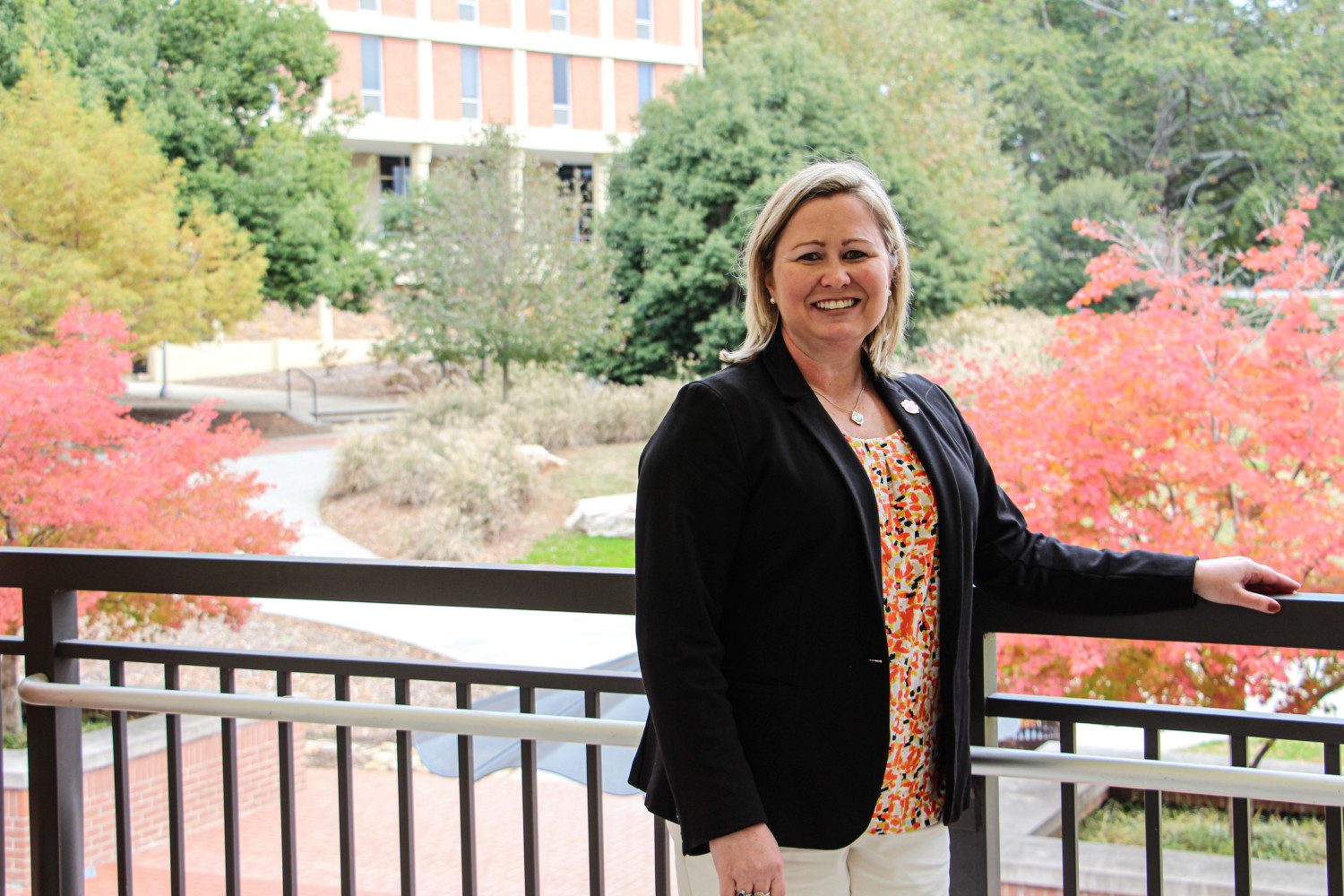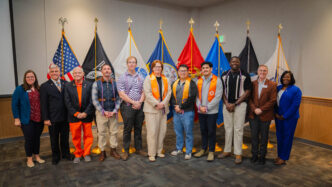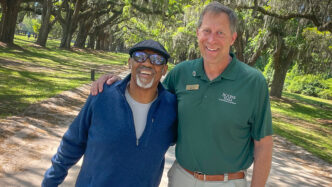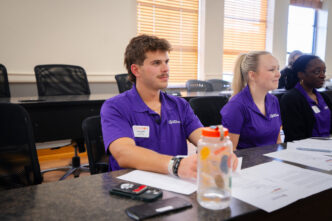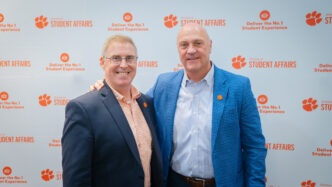Editor’s note: This is the latest installment of the “Student Affairs Talk” podcast for 2019-20. Communications Director for Student Affairs Philip Sikes visits with various leaders from the staff and student communities. This week’s featured guest is Kristin Walker-Donnelly, who serves as director of assessment with Student Affairs Business Operations.
—

Kristin Walker-Donnelly was introduced to Clemson University by chance. As a high school teacher, she brought a group of students to several colleges and universities across the Southeast and Clemson was among them. Little did she know at the time how the visit was going to impact her professional life. She pivoted from high school teacher to graduate school around the age of 30 and enrolled in Clemson’s master’s program for Student Affairs. Nearly 10 years later, she has two degrees from Clemson and is serving as director of assessment for Student Affairs.
In the podcast, Walker-Donnelly talks about her educational background, first full-time role at Clemson with the Michelin Career Center and her transition into the current position she fills with Student Affairs Business Operations.
Click the green ‘Play’ button below to listen.
2019-20 Podcasts
Paige Zoltewicz, University Housing & Dining
Miles Maynard, Graduate Student
Sarah Custer, Emergency Management
Cam Walters, Sophomore
Pam Davis, Campus Activities & Events
Ty Robinson, Junior
Jack Debbout, Senior
Almeda Jacks, Vice President for Student Affairs
Olivia Loynes, Junior
Full Interview Transcript
Q: Thanks for joining me today, Kristin. Walker-Donnelly … you recently added a hyphen to your last name, didn’t you?
Walker-Donnelly: I did. The reason for that decision was that I had presented and published a couple of pieces in the fields of student affairs, higher ed, integrative STEM education, and wanted to kind of keep my professional identity. That way, if I was presenting at a conference or had published something, what I had done prior to getting married this past summer stayed connected.
Q: So, let’s take a look back on your journey to Clemson. I believe you’re originally from Maryland, and you went to Radford University for your undergraduate education. What led you down the path that you’re on now?
Walker-Donnelly: Yeah, absolutely. When I was completing my bachelor’s education and looking at graduate school, my long-term goal was to be a high school guidance counselor. In the early 2000s, when looking at graduate programs at schools like the University of Maryland, they said they wouldn’t even look at your grad school application until you had three to five years of experience in a classroom. Which makes complete sense. But it’s interesting how the job market has changed, and now there is a high turnover and need for high school guidance counselors. Now folks can go directly through without that experience. But I’m a firm believer that everything happens for a reason. In teaching high school English for seven years up in the Washington, D.C. area, I also volunteered for the sorority I joined in college and found a true passion for working with college students. Even though I’d be teaching Monday through Friday, hop on a plane and go to a college campus and work with some really great college students over the weekend, it didn’t feel like I worked for seven days. I went to the Interfraternity Institute in the summer of 2007 and truly found a pathway of pursuing a graduate degree in student affairs. I kind of pivoted my career trajectory a little bit. And then, long story short, found Clemson when bringing a group of my students on a college road trip. Clemson was one of the institutions we looked at. It ended up being a perfect fit that I never knew was even possible when I brought my students here in the summer of 2009.
Q: What was it that drew you in to Clemson initially, was it the community itself or the master’s program? Take me through that thought process.
Walker-Donnelly: It was a blend. I remember taking the official campus tour with my group of high school students and thinking that Clemson had this nice feel of being a larger institution, but still a feeling of being somewhat intimate. That was something important to me, even when looking at my undergraduate education. What resonated with me with Radford University’s president at the time was when he said, “We’re large enough to serve you, but small enough to know you.” And I thought Clemson had that same type of feel. So, when I was looking at graduate programs for myself in the academic year of 2009-10, and I saw that Clemson had a master’s program, I thought to myself, “Hey, I’ve been to the campus and really enjoyed it.” At almost 30 years old, I decided to up and move my life to a place where I knew no one and pivot a little bit. I thought it would be for two years, and it’s ended up being almost 10 now. I couldn’t have imagined a better professional fit.
Q: After graduating from your program in 2012, did you go immediately into the professional working environment or begin pursuing your doctorate right away?
Walker-Donnelly: I did, all of the above actually. A full-time opportunity became available in the Center for Career and Professional Development’s Michelin Career Center. I was a graduate assistant there for a year and a half. An opportunity became available, and it was important for me to not be under-qualified or over-qualified. Even though I had seven years of full-time experience at the secondary education level, I wanted to make sure that I was accruing some full-time experience at the collegiate level while also working with students. I started working full-time in the Michelin Career Center while also pursuing my doctorate technically on a part-time basis. I finished it in just over three years. I really valued the opportunity to integrate what I was learning in my doctoral program immediately into my professional work here at Clemson.
Q: Was there anyone in particular on CCPD’s staff who took you under their wing?

Walker-Donnelly: Dr. Caren Kelley-Hall was my supervisor when I was a graduate assistant. It was actually her position that became available with the creation of the UPIC program. She moved over to be part of the UPIC staff, and Troy Nunamaker was her supervisor. He really helped me develop a vision and integrate what I was learning in the classroom into the professional environment. Dr. Neil Burton also helped show me what leadership looked like at a department level, what sort of challenges they faced as leaders. They would always tell me that leadership was about resource allocation. While it may not be one of the prettier definitions of leadership, it’s very true. I’ve definitely seen that a lot now with the work I do in assessment with the division.
Q: You went on to a full-time role as associate director for analytics and initiatives. For the lay person who may be listening, expound on that a little bit and give us an idea of what some of your day-to-day duties were like.
Walker-Donnelly: In the Michelin Career Center, assessment was kind of a committee — a group of folks where it was not any one person’s responsibility to look at continuous improvement and data collection. We saw it as an opportunity to really make it the focus of a position and help all of the teams that made up the greater CCPD. I was doing assessment support for UPIC, for example, even though they’re on the Academic Affairs side of the house. With that, it’s kind of the assessment part. We would look at trends such as what days of the week and what times of the day students were coming in at a higher rate than others. It helped allocate our counselors’ time more effectively. We would look at when workshops were being given, so we could again allocate the resources of our staff to meet the students where they were in classes, and making sure those interactions and meetings were worthwhile. The initiatives side was actually an opportunity we saw around 2015 and how the job market in higher education was changing. There was an articulation gap. So, you would hear a lot of times on the news there was a skills gap. College students didn’t have the skills necessary to enter, navigate and have a career in the workforce. We truly believed it was an articulation gap. Our students were having phenomenal experiences inside and outside of the classroom, but couldn’t exactly translate that to employers or graduate or professional schools. So, the initiatives part of the title was helping to create somewhat of a campus culture of helping our students. Being able to articulate what they were learning so that they could have a successful career afterwards.
Q: The core competency initiative was one of your calling cards. How proud of that development that continues today and is pretty much integrated into what they do?
Walker-Donnelly: Absolutely. It truly is. Clemson is a leader in the national conversation around that. We, along with the University of Tampa, created a competency symposium that is now entering its fourth year in 2020. We will be at the University of Texas at Austin. We’ve been to Washington University in St. Louis, we’ve been to Ohio State University, and of course Clemson hosted the first one. We continue to be at the forefront of that conversation. I’m actually going down to the University of Tampa to speak to their Division of Student Affairs, along with faculty and staff partners in their academic divisions, to talk about how they can improve their Spartan Ready, which is their version of our core competency program. So, it’s really growing. We continue to have folks reach out to us. Just recently, George Washington University reached out and wanted to know how we were working with athletics in that area. So, there’ll be some calls in the month of December to share some ideas. Kathy Horner is now the champion of this initiative, so now that I’ve moved over to Student Affairs Business Operations, she’s now taking our core competency program to the next level. Which is really exciting. She’ll be sharing some of those developments at our Experience: Impact event next week.
Q: The 2017-18 academic year was a highly decorated one for you personally. You were one of our employees of the year in Student Affairs, you earned an Award of Excellence from the Board of Trustees and were named a rising star by the National Association of Colleges and Employers. How gratifying was that time in your life, not just receiving the accolades, but feeling vindicated for some of the work you were doing?

Walker-Donnelly: I think truly having education in my blood — it didn’t necessarily run in my family, but if you ask my younger sister, on rainy days during the summer we played school — it’s always been something that I’ve been passionate about. Making a leap later in my career at 30 years old, kind of taking a leap of faith and shifting where I was serving in the area of education was big. To have others recognize your work and that it’s meaningful, that’s really where it is. It’s not so much the award itself, it’s just helping to make a difference in a small way. Working at an institution and in a field with so many wonderful individuals, that’s kind of the true pride in that area.
Q: You touched on it a little bit, but over a year ago now you joined Student Affairs Business Operations. What prompted the change, first of all? And what was it like to make yet another transition?
Walker-Donnelly: I think there was an opportunity to kind of build on the work that I did with the CCPD with assessment, to try and serve the larger division. The previous director of assessment, Todd Chamberlain, has done a really great job in setting some foundational pieces. It was now time for us to take it to the level of a practical standpoint, from strategic planning and integrating the finances, the human resources and assessment — helping all of our departments see the integration of those things for both short- and long-term planning. I’m really thankful for the groundwork he laid, because it’s enabled us to take our assessment work to the next level and help us think more broadly. Not just student learning outcomes, but also where we’re spending our time and our talents. What’s that return on investment to best support our students? So, it was another leap of faith. With that, I’m very appreciative of Lisa Bona and being part of her team. I’m also grateful for everything and all the opportunities that I had at the CCPD to look and dive into assessment. I’m appreciative to be able to help our collective division tell its story, because we are doing some great work. Over the last year, with our value mapping process, probably the most valuable part of it for me was being able to learn more about the different areas and ways we impact students.
Q: You read my mind, because I was going to segue to value mapping. You recently presented at a conference on the value mapping process with our departments and related to a new way of aligning resources to priority areas, tying them into our strategic plan. Take listeners through the process more and how you think it’s helped those departments focus on the things they should be focusing on.
Walker-Donnelly: Dr. Frances Kennedy is an assistant to the provost with the academic quality improvement plan. What she was doing with other areas of the university, we were mirroring in Student Affairs. We’ve been able to progress at really great speeds. Faster than which we hoped. As Lisa says, we had a really aggressive timeline and we tackled it, thanks to the trust from all of our departments in being navigated through a new and different process. The value mapping is grounded in some industrial engineering continuous improvement areas, and what it allows you to be able to focus on is the value you’re bringing. For our departments, they answered the question, “Why do you exist?” or “What are you doing that no other department at Clemson is doing?” So, it’s basically what you need to do really well in order to fulfill that existence. And then the metrics — which is much more the assessment piece — is how you know you’re doing that well. What are some of those key performance indicators that you can look at to determine success? Where you have been, and what is your baseline? Where do you want to be? What’s the target, and when do we want to be there by? Looking at that data on a quarterly basis — so that everyone in a department can see how their work funnels up to the larger existence within the department and at the division level — provides a real integrative process so that everyone sees the focus of their work within ClemsonForward. They can also be part of the ongoing conversation to look at how things are doing and how we can make adjustments more frequently. That way, we don’t look at a data point at the end of the year and think, “Man, I wish had known that, we would have done something differently.” By looking at it on a quarterly basis, it becomes part of the culture of continuous improvement and adjustments.
Q: Some of the other initiatives you’ve taken on during your time with SABO are developing and executing our recent staff experience survey and the implementation of a new series entitled Experience: Impact. Take us through those two developments and how you see those.

Walker-Donnelly: Before conducting the staff experience survey, I had an idea of getting the division together around our core themes of health, safety and wellness, student learning, inclusive excellence and staff experience. I wanted to allow our departments to share short snippets — about seven minutes of content and three minutes for questions — and in an hour, you’ve allowed five different areas to be able to share how they’re helping us move forward as a division within that core theme. It started off first with health, safety and wellness. We have a variety of different areas that are presenting. And next up we have student learning. In the spring semester, we’ll conquer inclusive excellence and staff experience. it keeps the work that we’re doing that is being measured through value mapping and the dashboard process at the forefront. It gives people a handle on what’s going on and some of the great work being done. But it also provides a wonderful opportunity for our departments to be able to present their work to others in a concise manner, and in a way, that if you don’t speak the language of that area on a daily basis, you can understand what’s helping serve our students and other stakeholders.
With the staff experience survey, that was really an opportunity for us to be able to kind of look at the landscape and get some feedback from our employees on some areas of opportunity at the division and department level. So, we’re excited to be able to share that data with our department heads. We’ve identified some areas, that if we all focus on certain things — and, as a preview, one of those things is onboarding. How can we revamp our division onboarding process and support our departments? No matter where you are in our division, we want you to feel supported and connected and know how your work is feeding up to a larger good. We’re really excited about disseminating that information out.
Q: We’ve talked an awful lot about work, but I know you’re not always working. When you do find time away, what types of things do you enjoy doing?
Walker-Donnelly: I am definitely a football fan. I joke that my dad did not have any sons, so he imparted all of his football wisdom on me. But, as a University of Maryland alum, we didn’t watch a lot of college football growing up. it was a lot of Washington Redskins. I distinctly remember attending my first Clemson football game my first year of graduate school and screaming a couple of things out there are more NFL in nature, such as “Why did you call a timeout before the two-minute warning?” There is no two-minute warning in college football. So, I got to re-learn some football. It’s been really awesome to watch Dabo’s (Swinney) leadership and have our team evolve and watch that from the time I came to Clemson until now. I also enjoy traveling. It’s a passion point. My husband and I have identified some areas we want to check out. We’ve done Savannah and Charleston. Some areas that, if we were to move away, we’d be able to say we’ve been there. It’s been interesting seeing some different areas and connecting with family and friends in those areas. We go home to Maryland and to Iowa where his family is. We’ve been to Upstate New York, where Cornell University is, because my sister and brother-in-law work there. We travel for pleasure and to reconnect with family and friends. I love trying new recipes and throwing some things on the grill. Trying my hand at different ways to approach cooking. In my spare time, those are some of the things I enjoy.

